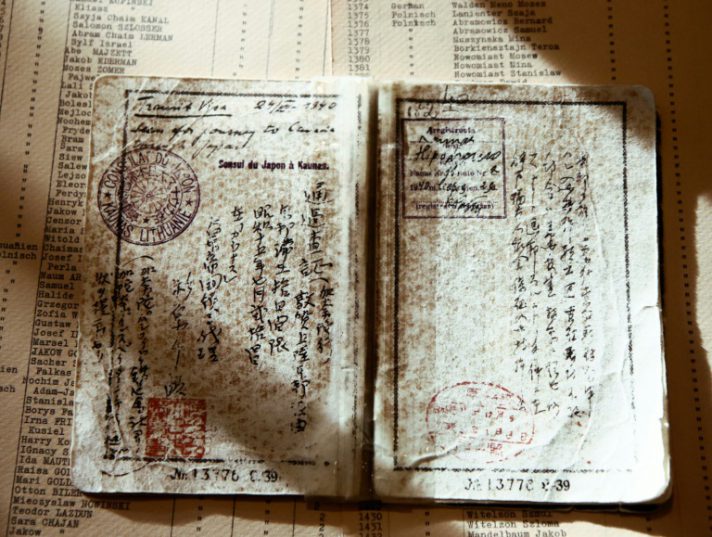Lions eager to fix unacceptable Glasgow loss against Edinburgh
A Japanese diplomat who saved 6,000 European Jews from the Holocaust by issuing visas to allow them to escape war-torn Lithuania will be hailed by Japan's premier, decades after defying Tokyo to help the refugees.
Prime Minister Shinzo Abe will pay tribute to Chiune Sugihara on Sunday when he visits the two-storey building that housed the consulate where he worked in the Baltic state’s second city Kaunas.
Sugihara is thought to be among around 15 diplomats who issued visas for European Jews during the Second World War, and is often called “Japan’s Schindler” — a reference to German industrialist Oskar Schindler who is credited with saving 1,200 Jews during the Holocaust.
He was appointed vice-consul in October 1939, one month after the then allies Nazi Germany and Soviet Union attacked and carved up neighbouring Poland.
Japan saw still-independent and neutral Lithuania, which harboured thousands of Polish refugees, as a perfect location for the erudite polyglot Sugihara to collect intelligence about military developments in the region.
The relative calm ended the following year when Moscow invaded the country. Crowds of Jewish refugees, mostly from occupied Poland, started lining up at the Japanese consulate seeking visas to flee.
“After the Red Army entered Lithuania, refugees realised it will not be the same neutral country that gave them refuge a year earlier,” Vytautas Magnus university historian Linas Venclauskas told AFP.
“Soviet-occupied Lithuania was less predictable and more dangerous,” he added, speaking in Sugihara’s former office which still has a WWII-era Japanese flag hanging on the wall.
– Escaping Lithuania –
Sugihara wasted no time and issued over 2,000 visas in July and August, sometimes working 18 hours per day and evading strict instructions issued by Tokyo.
He cooperated closely with the Dutch consul in Kaunas, Jan Zwartendijk, who provided papers allowing Jews to reach the Dutch Caribbean territory of Curacao after transiting through Japan.
During that time, the Soviets fully annexed Lithuania and ordered foreign diplomats to leave by September.
Sugihara kept issuing visas in Kaunas Metropolis hotel and, according to some witnesses, even from the Kaunas–Berlin train before he left for Germany.

Sugihara worked around the clock, issuing over 2,000 visas in July and August, sometimes working 18 hours per day and evading strict instructions issued by Tokyo
With visas in their pockets, Jews took a gruelling two-week railway trip across Russia to Vladivostok in the far east and then travelled by boat to Japan.
Many of them were later sent to the Shanghai Ghetto and stayed there until the end of the war.
For those who failed to flee, tragedy was imminent: more than 90 percent of over 200,000 Lithuanian Jews perished under the 1941-44 Nazi German occupation.
Sugihara resigned from the foreign ministry in 1946, and some historians said he was forced to do so for defying the rules while in Lithuania.
He died in 1986, two years after receiving Israel’s “Righteous Among the Nations” title honouring persons who saved Jews during the Holocaust.
– Legacy still alive –
Today, there are around 3,000 Jews living in Lithuania, a NATO and eurozone country of 2.8 million people.
For their leader, Faina Kukliansky, Sugihara’s historical legacy is “immeasurable”.
“Sugihara’s steely Japanese resolve and his spirit of European humanism built a bridge to life for six thousand Jews while his legacy builds bridges among nations and generations,” she told AFP.
Kaunas and Lithuania’s capital Vilnius named streets and squares after Sugihara while the former consulate is now a museum. Last year, 14,000 Japanese tourists visited the house in a leafy Kaunas neighbourhood.
“Lithuania is proud of Mr Sugihara’s legacy. We are very happy to see that owing to… Sugihara House, tourism from Japan to Kaunas and Lithuania in general has increased impressively,” Lithuania’s Foreign Minister Linas Linkevicius told AFP.
“I imagine that Prime Minister Shinzo Abe’s visit will also add to the growth of such interest,” he said.
Abe, who had been previously criticised for appearing to minimise Japan’s own atrocities during the war, will visit to Lithuania after becoming the first Japanese leader to visit neighbouring Estonia and Latvia.
His six-day trip in the region, which begins Friday, also encompasses Bulgaria, Serbia and Romania.
Download our app